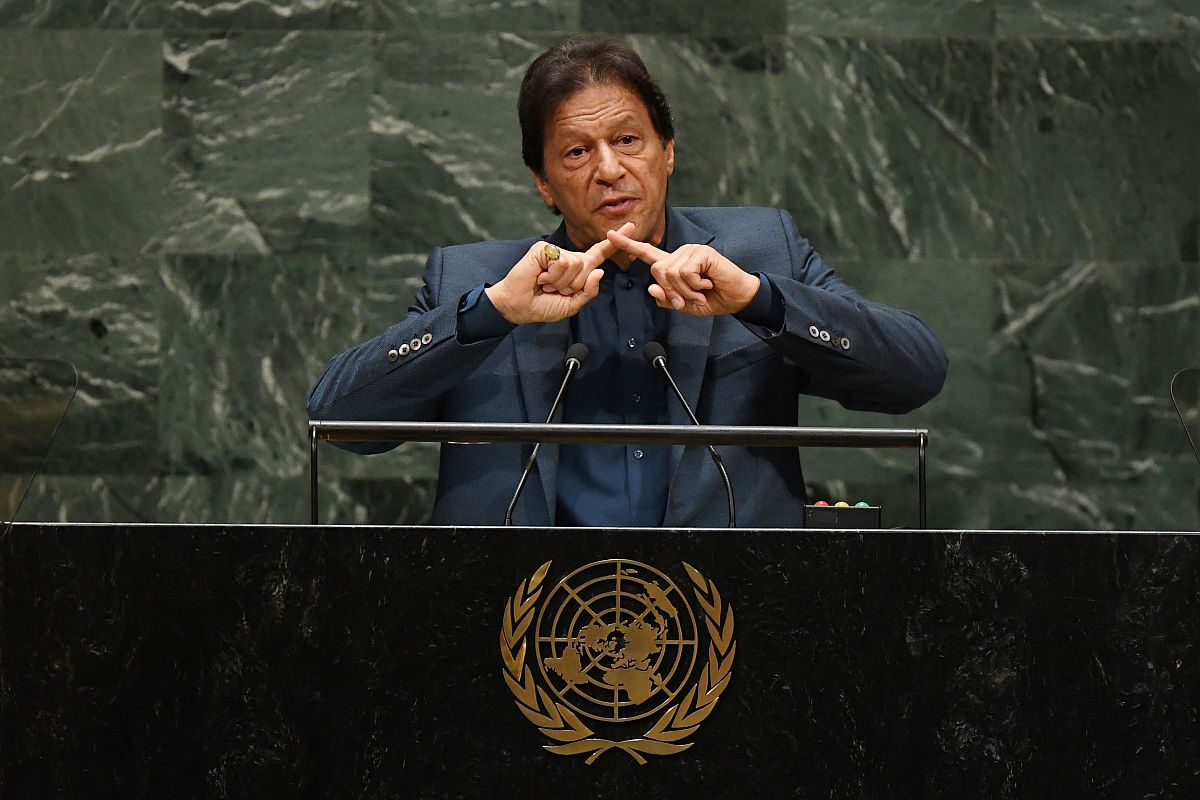Pakistan Prime Minister Imran Khan on Friday raised the Kashmir issue in his maiden address to the UN General Assembly and demanded that India lift the “inhuman curfew” in Kashmir and release all “political prisoners”.
In an hour-long speech at the UNGA session, that far overshot the 15-minute time limit, Khan repeated his war rhetoric saying that if there was a face-off between two nuclear-armed neighbours, the consequences would be far beyond their borders.
Advertisement
He warned that Pakistan will fight if a conventional war starts with India.
Imran Khan, in his speech, also cited the standoff between the two nations in February following the Pulwama attack and India’s subsequent air strikes on terror camps in Balakot in Pakistan.
“Two nuclear-armed countries will come face to face, like we came in February,” he said.
Khan’s speech was a repetition of his talks elsewhere in the last few weeks.
Khan spoke at length about India’s decision to revoke Article 370 in Jammu and Kashmir, and criticised the government’s move to put in place a communication lockdown.
Giving his scenario for war, Imran Khan said that when the “curfew” is lifted in Kashmir there will be a bloodbath.
Asserting that the situation in Kashmir will deteriorate once India lifts the curfew, Khan said, “You hope for the best but be prepared for the worst.”
He said once the curfew is lifted, “there will be a reaction” and India would blame Pakistan.
He said India ended the special status of Jammu and Kashmir, flouting 11 resolutions of the UN Security Council, the Simla agreement and its own Constitution.
“What is the world community going to do? Is it going to appease a market of 1.2 billion, or is it going to stand up for justice and humanity,” the Pakistani Prime Minister asked.
“…This is the time to take action. And number one action must be that India must lift the inhuman curfew” in Kashmir, he said. “It must free all political prisoners,” he added.
He went on to say that the world community must give the people of Kashmir the right to self-determination.
Imran Khan also made the bizarre claim that “there are no militant organisations in Pakistan.”
Khan further used the forum of the UN General Assembly to openly appeal to the global Muslim sentiment on the issue of Kashmir.
In an openly radical Islamist statement, Imran Khan said that the Muslims in India, which has the second largest population of Muslims in the word, would get radicalised watching the Kashmiris.
While Prime Minister Narendra Modi spoke of his country’s achievements and its inspiration to the world for development and the possibilities of the future, with just one mention of the world uniting against terror, his Pakistani counterpart went in sharp contrast with his war rhetoric.
PM Modi had said India is a country, that has “given the world, not war, but Buddha’s message of peace.”
Earlier on Thursday, the diplomatic face-off between India and Pakistan flared up ahead of the UNGA sessions as Pakistan Foreign Minister Shah Mehmood Qureshi failed to turn up for EAM S Jaishankar’s opening statement during the SAARC meeting.
Qureshi arrived only after Jaishankar had left the room and said that his country will not engage with India “until and unless they lift the siege” in Kashmir. When pressed further on his late arrival, Qureshi said he does not want to sit with the Indian minister as a mark of protest over Kashmir.
Tensions between the two countries have spiked since India abrogated Article 370 of the Constitution to revoke the special status of Jammu and Kashmir in August. The decision evoked strong reactions from Pakistan, which downgraded diplomatic ties and expelled the Indian ambassador.
Pakistan has been trying to internationalise the Kashmir issue after India withdrew the special status of Jammu and Kashmir, but New Delhi has asserted the abrogation of Article 370 was its “internal matter”.
On Thursday, the US said any easing of tensions between India and Pakistan is dependent on Islamabad taking action against those who engaged in cross-border infiltration.











